Indigenous Sports Month: How John Moriarty went from stolen boy to football hero
A Stolen Generation victim who became the first Indigenous man to play football for Australia is continuing to make his mark on the game by nurturing a new wave of exciting Indigenous talent.
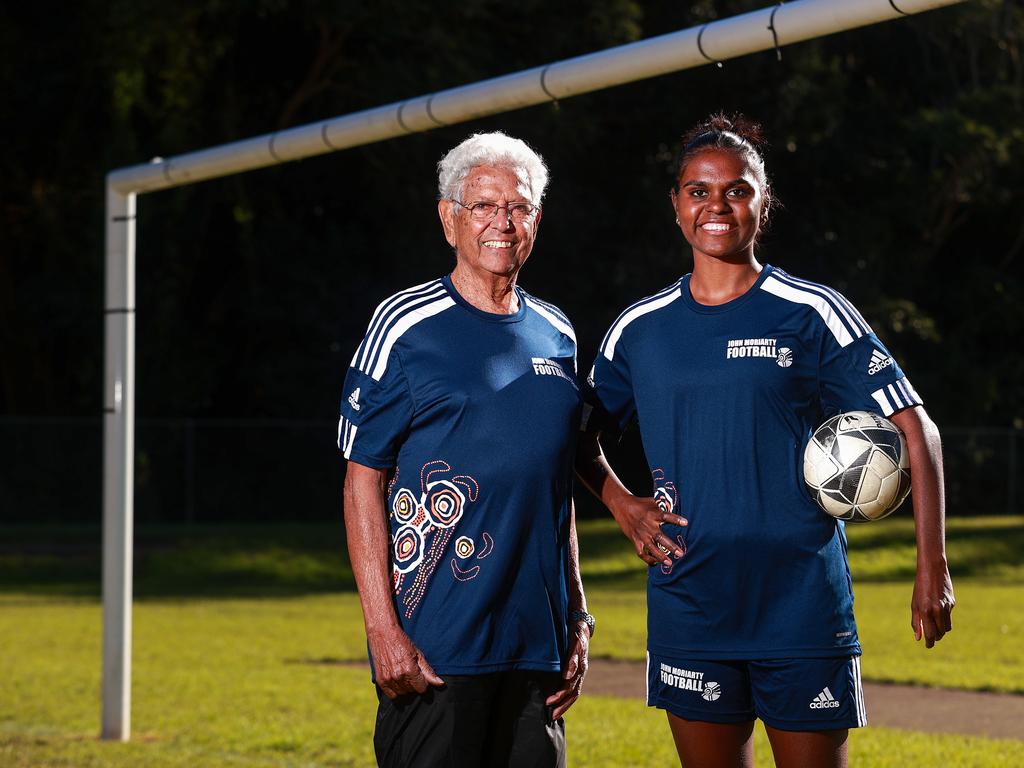
When the Australian government had a policy to take Aboriginal children from their families, particular attention was placed on half-castes who had “full-blooded” Indigenous mothers.
In the remote Northern Territory town of Borroloola, in 1942, a half-Irish half-Aboriginal boy named Jumbana Kundareri was excited to attend a new school.
“My mum took me to Roper River to go to school here, and after a few days at school she went to pick me up, I was gone.”
Stream Over 50 Sports Live & On-Demand with Kayo. New to Kayo? Try 14-Days Free Now >
That boy is now known as John Moriarty, a Stolen Generation victim who became the first Indigenous man selected to play football for Australia.
“They loaded me on the back of an army truck with some other young mothers and other kids my age,” Moriarty said.
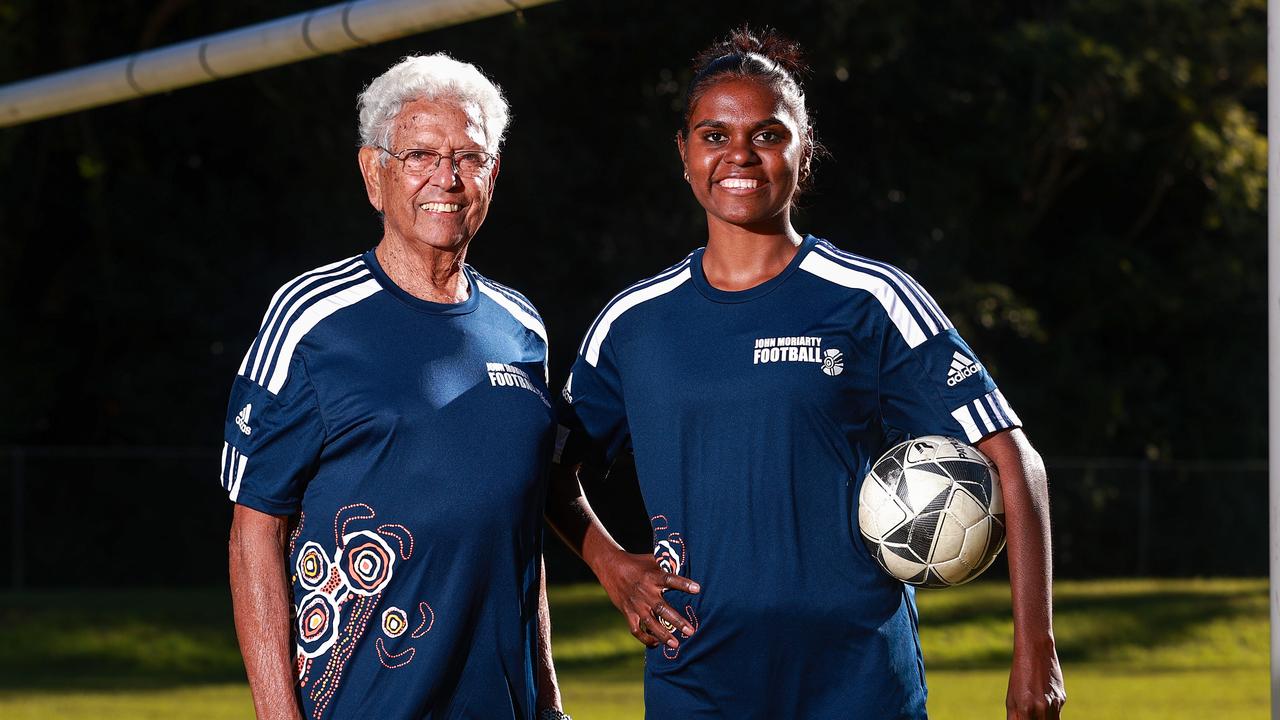
“And we were put on an army truck in Roper, then to Alice Springs, then put on the train there to Adelaide, Melbourne, Sydney and to Mulgoa near Penrith, and put us in a church home there.
“We weren’t told why we were leaving, but we could have been seen as half-castes in those days. It was the government that took us away.
“It was pretty harsh being removed from your mother and family.”
He didn’t see his mother again until he was a teenager.
“I was lucky enough to connect with her again, 11 years later when I was 15,” Moriarty said.
“She was in Alice Springs, I’m sure someone from the welfare system organised for her to be there when I was. She saw me from across the road, looked at me, asked me my name and where I was from. And she ended up saying, ‘I am your mother’.
“I was very happy to meet her, and I kept in touch, but with the jobs I had, I could only get up there during the Christmas holidays.”
Had Moriarty not been ripped away from his family, he would not have discovered football, become a hero to thousands, and set up his own foundation that for 10 years has helped children from remote communities, like Shadeene Evans, to discover sport and opportunity beyond their mind’s horizon.
“I didn’t lose my culture,” he said.
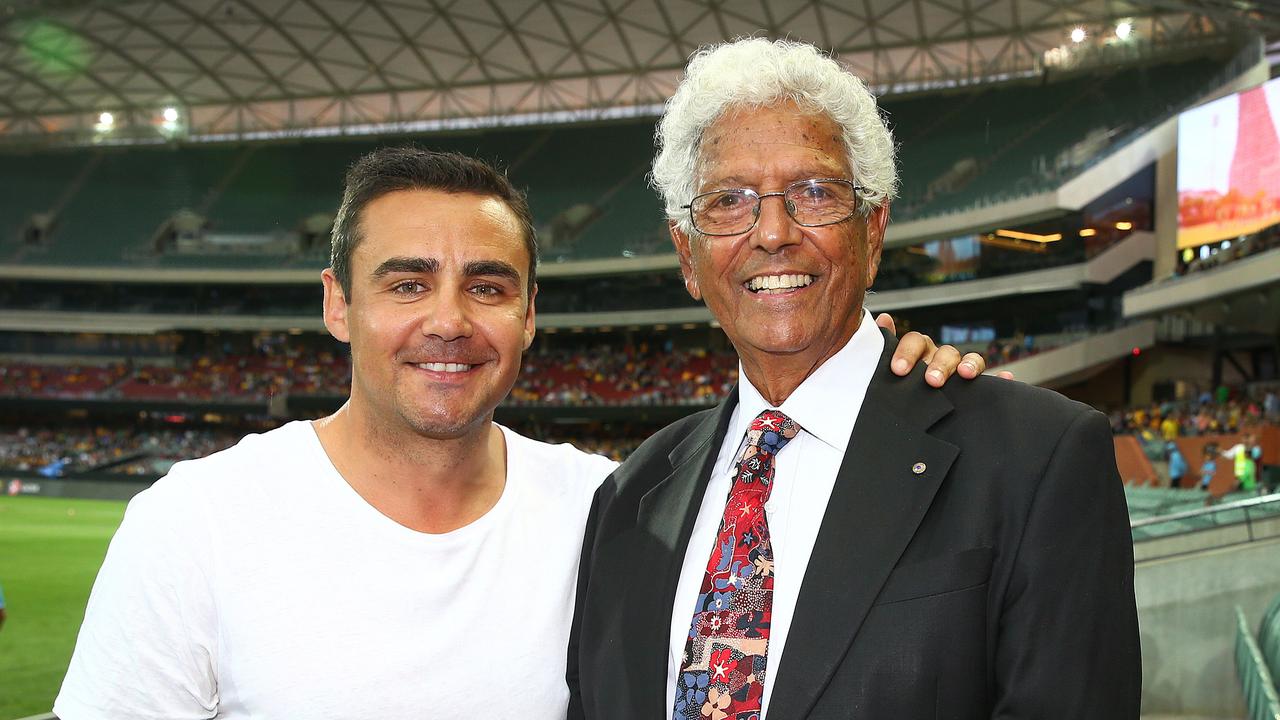
“I was reminded of my Aboriginal connections by the elders I was with, and with those new migrants that came from overseas, a lot of those people were not accepted in the Australian community as smoothly as they are now.
“And I mixed with them and became part of their soccer community, and of course when I was recommended to play overseas, that kept me in touch with what the world could be like and our boundaries could be expanded from the discrimination aspects of the culture here in Australia at that time.
“When I was first taken, we were fortunate to be there with our older people and they reminded us of who we were and maintained connections with family, at least in our minds.
“Then we were moved to Adelaide because the priest had a home in Adelaide, a place called Semaphore, St Francis House it was called.
“And our place here was next to a soccer ground. We were watching the under-18 state team train and the coach of the state team came over to the older boys and said, ‘can you warm us down?’ And the big boy said, ‘yes’. We beat them, I think it was 8-nil.”
At first, Moriarty rejected the coach’s idea for him to take up the game, but quickly changed his mind when offered a pair of boots.
“We were so poor we didn’t have any boots, anything like that. And that got me into the game,” he said. “When I was at Port Adelaide I was selected for South Australia and Charlie Perkins, Gordon Briscoe, Jerry Hill and I were in the same home and we all played soccer.
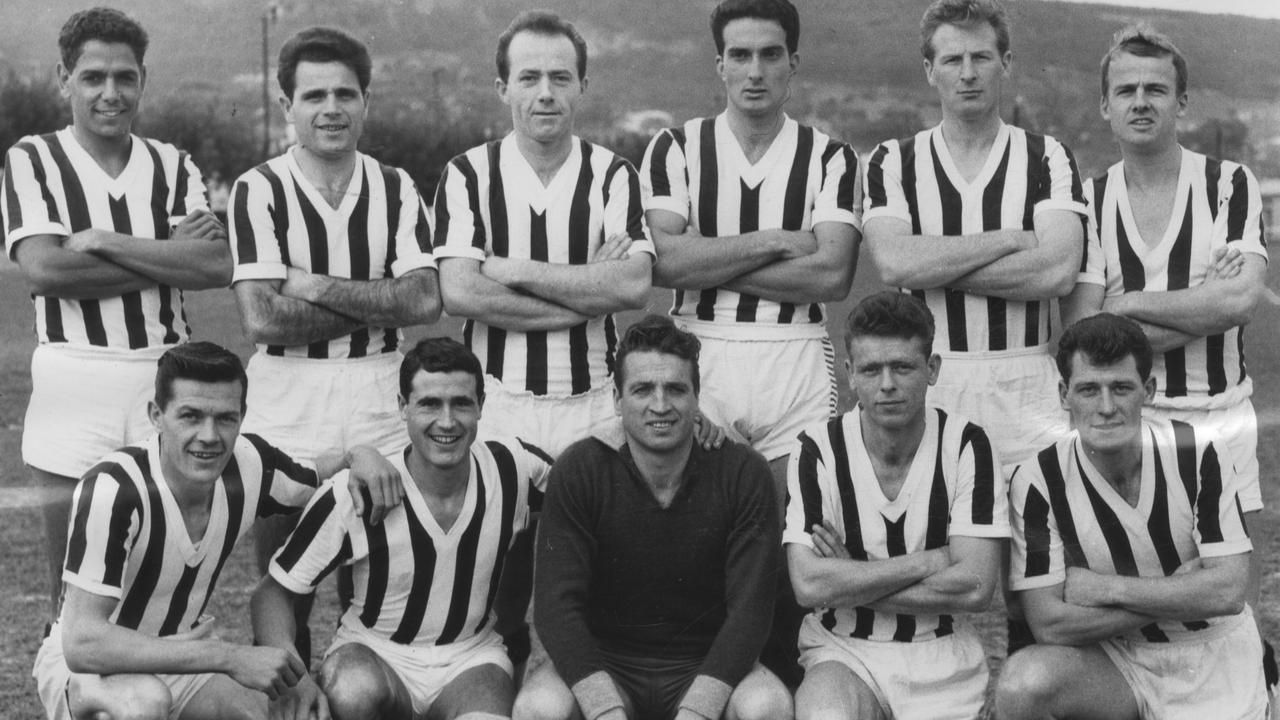
“Charlie and I were selected to play with the state team in Perth, that was my first plane trip.”
Moriarty excelled and was quickly picked to play for his country, only to be denied an international cap.
“I was so happy to be selected for Australia, we were about to tour South East Asia and FIFA banned us because Australia had taken on board uncleared Austrian internationals to play and train here,” Moriarty said.
“And that’s what stopped us. And I had an injury in the meantime with my knee that put me out, and that stopped me playing international games. But what was good for me was that I was able to benefit from the game, meeting, mixing at that level.
“And that’s what inspired my wife Ros and I to set up our program, not only in Borroloola but to Tennant Creek and Robinson River.”
The foundation now helps 2000 children a week across 19 remote communities and 20 public schools – a giant leap from 2012 when they started with 100 children in Borroloola.
The inaugural scholarship recipient was Evans, the 20-year-old W-League and Young Matildas star who grew up in Borroloola.
Evans was among a group of children from the town taken to the 2014 World Cup in Brazil courtesy of the John Moriarty Football Foundation, and has developed into a young leader.
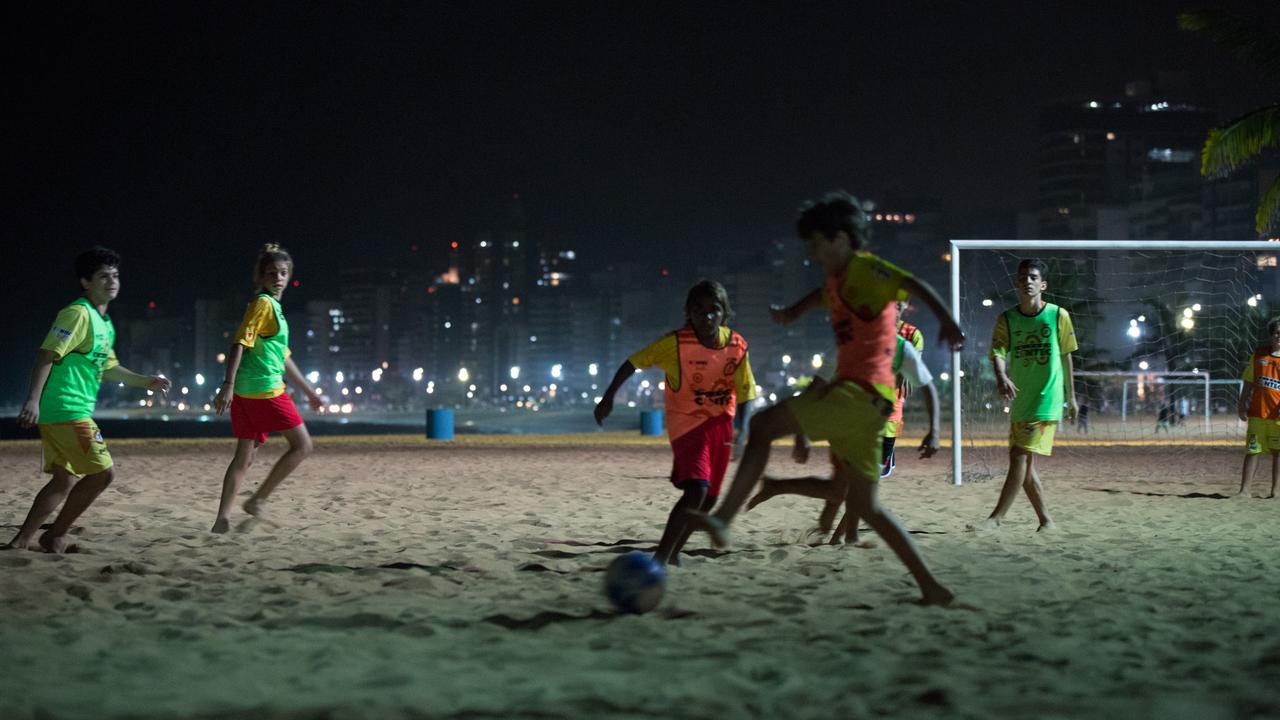
From a tin house in an outstation, Evans had to come to grips with life in the big city when her scholarship got her into Westfield Sports High School in Sydney, which has a bigger population than her hometown.
“I got homesick multiple times, I wanted to just go home,” Evans said. “And I could have stayed there.
“Once I’m home, like, I love this. I love the feeling being home, but I can’t grow up knowing just community. I always have this in my head, ‘just push, just push yourself’.
“I told myself, ‘go back, experience everything, keep going’.
“And what made me stronger was going home, and then coming back every time.
“I’m grateful that I did it, showing other Indigenous kids, showing my community you can do it, and giving them someone to look up to.
“Being a mentor for the Moriarty Foundation, I definitely say to other kids, opportunities like this don’t come around easily, so take it and just see where it takes you.
“My dad [Shaun] shaped who I am today.
“He was in NORFORCE (North-West Mobile Force infantry regiment) in Darwin, he worked for Parks and Wildlife, and he was a marine ranger, he worked really hard.”
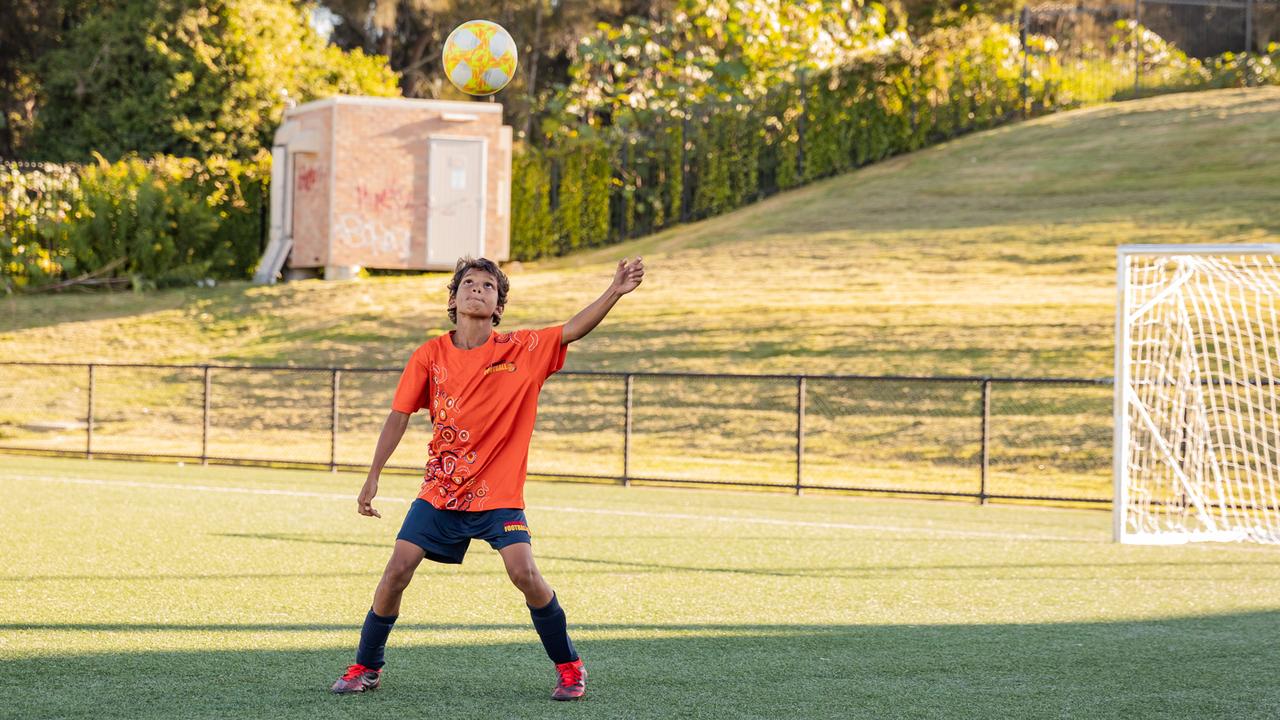
Having finished last season with Adelaide United, Evans is now weighing offers from several W-League clubs, and is determined to make her international debut in coming years.
Following in her footsteps is 12-year-old Colin Walsh, a talented JMF scholarship holder from Mareeba in Queensland.
“I’ve been playing football for one year, my football hero is Cristiano Ronaldo, I want to play like him,” Walsh said. “My dream one day is to play for the Socceroos.
“I’m really excited to get a JMF Scholarship to come to Sydney and go to a top high school and keep getting better at football.”
Eighty years after a young Aboriginal boy had his world taken from him, another dares to dream of taking on the world.
Originally published as Indigenous Sports Month: How John Moriarty went from stolen boy to football hero






